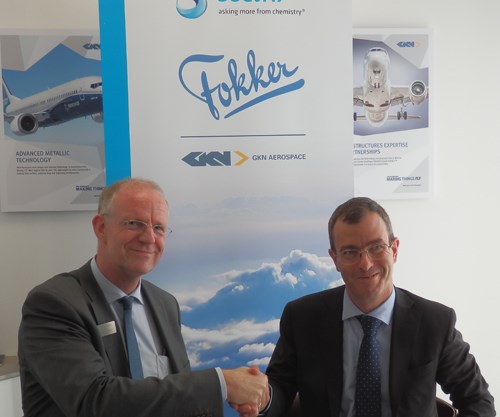Solvay Composites of the United States and Fokker of the Netherlands, a subsidiary of British GKN Aviation, announced at the Paris Air Show that they are jointly promoting and accelerating the use of thermoplastic composites in aircraft. At the same time, Solvay Will become Fokker’s preferred supplier of new lightweight thermoplastic composites.

(Toine Verbruggen, Fokker, GKN Aerospace, and Carmelo Lo Faro, Solvay’s Composites Global Business Unit)
Under the agreement, Solvay and Fokker, a subsidiary of GKN Aviation, will combine their expertise to advance technological development of thermoplastic composites and improve processes and cost competitiveness. The companies have complementary materials expertise in thermoplastic polymers and fiber-reinforced composites, the companies said. Fokker also leads the way in parts design and manufacturing, translating technology into innovative solutions for aerospace customers.
“Solvay’s strategic partnership with Fokker is an important step in our journey to become a leading supplier of thermoplastic composites to the aerospace, oil and gas and automotive industries. By partnering with Fokker’s expertise in design and manufacturing,” said Carmelo Lo Faro, Solvay’s president of global operations. The combination of knowledge can further deepen our understanding of market needs and application challenges of new materials to industrialize the manufacturing of thermoplastic composites and parts.
Toine Verbruggen, Vice President Procurement and Supply Chain Management at Fokker, said: “This agreement will contribute to our technology leadership in thermoplastic innovation. We design and manufacture the systems and components our customers need, and this partnership will allow us to Providing customers with more advanced and efficient solutions. “Thermoplastic composites can reduce the weight of aircraft components by up to 25% compared to traditional metal solutions. This helps reduce emissions, improve aircraft performance and make parts manufacturing more efficient.
